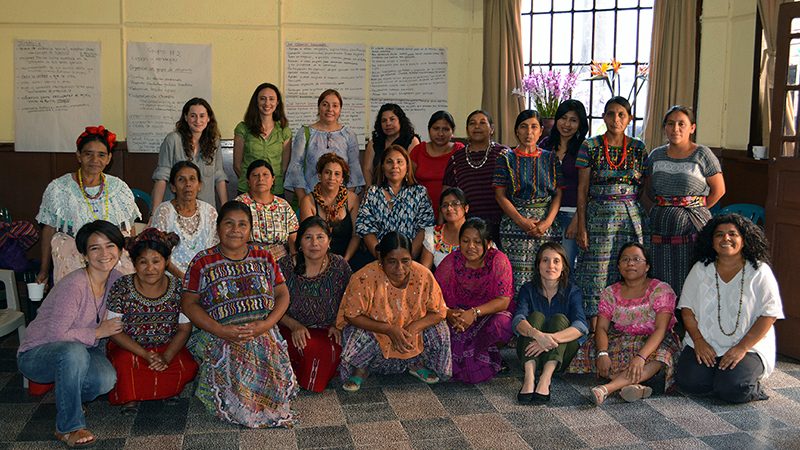The Guatemala Human Rights Commission/USA expresses extreme concern at the Guatemalan Government’s announcement that it is closing down the Peace Archives Directorate of the Peace Secretariat (SEPAZ) and dissolving its investigative team, effectively canceling their projects to publish historical reports and denying future contributions to criminal investigations.
The work of the Peace Archives Directorate (Dirección de los Archivos de la Paz, DAP) has been integral to ongoing efforts to institutionalize the peace process and promote transitional justice, and has contributed greatly to the public’s access to truth and historic memory.
The Directorate’s investigative researchers and their reports have provided key evidence for human rights prosecutions, such as the military chain of command at times when the army committed massacres, torture and forced disappearances. Recently, Archive staff were called upon to provide expert testimony in emblematic cases such as the Genocide Case brought against former dictator Efraín Ríos Montt.
Created in 2008, the Directorate’s mandate is to “receive, analyze, classify, compile and digitalize military archives in order to establish human rights violations committed during the internal armed conflict,” recognizing explicitly that “the clarification of historic truth has been part of the Guatemalan peace process given that it contributes to the dignification of victims” of the conflict. In 2009, the mandate was expanded to include documents from other Government offices that could help establish human rights violations.
In only four years, the office has digitalized more than two million documents and published nine books that analyze themes such as the Presidential General Staff (Estado Mayor Presidencial, or EMP), illegal adoptions, the Military Diary (el Diario Militar), and the labor rights movement.
Nevertheless, the Secretary of Peace, Antonio Arenales Forno, announced on May 31, 2012, that the investigation and analysis provided by the Archive is not reason to maintain the entity, saying: “Today the decision was made to eliminate the Directorate, canceling contracts for which I find no justification and the functioning of an office I find makes no sense.” The focus of the Peace Archives, he maintained, should be on providing information for the National Reparations Program, not on investigating the military, an erroneous justification given that the dignification of victims through the clarification of the truth is considered an important element of reparations.
Since January, 2012, when retired General Pérez Molina assumed the presidency, 23 staff members of the Directorate have been dismissed, including the former director Marco Tulio Alvarez. In April 2012, five technical archival experts were let go, and on May 28 of the same year, 17 investigators and other experts were notified that their contracts had been prematurely terminated. Members of the SEPAZ union, SITRASEPAZ, have denounced the firings as illegal under existing procedural guidelines.
The closure will also terminate an existing agreement of cooperation between the Peace Archives and the Public Prosecutor’s Office and will impede the Archive’s contribution to criminal investigations into human rights violations. Furthermore, the comments of Arenales Forno demonstrate not only a lack of respect for victims of the internal armed conflict, but a genuine threat to their right to truth and justice.
By dismantling the entity designed to oversee and manage the entirety of documents pertaining to human rights violations committed during the internal armed conflict, Secretary Arenales Forno and President Pérez Molina will extinguish an invaluable contribution to the preservation of historic memory and to the State’s obligations under the Peace Accords, at the same time obstructing efforts to investigate the military for egregious human rights violations and crimes against humanity.
The Guatemala Human Rights Commission calls on the Guatemalan government to:
- Strengthen, not weaken, the Peace Archives Directorate and respect its important role in promoting transitional justice;
- Reestablish formal collaboration and inter-governmental agreements that were terminated between the Directorate and the Public Prosecutor’s Office;
- Reinstate any worker whose contract has been illegally terminated;
- Explain the fate of the digital archives maintained by the Directorate and the public reading room;
- Clarify and make transparent the plans to restructure SEPAZ, the National Reparations Program (PNR) and the Presidential Human Rights Commission (COPREDEH).
Guatemala Human Rights Commission/USA
Washington, DC
GHRC denuncia clausura de la Dirección de los Archivos de la Paz
La Comisión de Derechos Humanos de Guatemala en Estados Unidos (GHRC) expresa su profunda preocupación por el anuncio del Gobierno de Guatemala de clausurar la Dirección del los Archivos de la Paz de la Secretaria de la Paz (SEPAZ) y desarticular su equipo de investigación, efectivamente anulando sus proyectos de publicaciones de informes históricos y de la memoria histórica y negando futuras contribuciones a investigaciones criminales.
El trabajo de la Dirección del los Archivos de la Paz (DAP) ha sido integral en los continuos esfuerzos para institucionalizar el proceso de paz y justicia transicional y ha aportado grandes contribuciones al acceso público a la verdad y la memoria histórica.
Los investigadores de la DAP y sus publicaciones han brindado evidencia clave en juicios de derechos humanos, así como sobre la cadena de mando del Ejército en tiempos en los que cometió masacres, tortura y desapariciones forzadas. Recientemente, personal de la DAP fue citado a dar testimonio como perito en casos emblemáticos como el caso de genocidio contra el ex dictador Efraín Ríos Montt.
Creada en 2008, la DAP tiene el mandato de “recibir, analizar, clasificar, compilar y digitalizar archivos militares con el fin de establecer violaciones a los derechos humanos cometidas durante el conflicto armado interno”, reconociendo explícitamente que “el esclarecimiento de la verdad histórica ha sido parte del proceso de paz guatemalteco y que contribuye a la dignificación de las víctimas” del conflicto. En 2009, el mandato fue ampliado para incluir documentos de otras instituciones del Estado que pudieran tener información sobre violaciones a los derechos humanos.
Tan solo durante cuatro años, la oficina ha digitalizado más de dos millones de documentos y ha publicado nueve libros que analizan temas como el Estado Mayor Presidencial, adopciones ilegales, el Diario Militar y el movimiento sindical.
Sin embargo, el Secretario de la Paz, Antonio Arenales Forno, anunció el 31 de mayo que la investigación y análisis que se lleva a cabo en la DAP no es suficiente motivo para mantener la entidad con vida, diciendo que: “Hoy por hoy se tomó la decisión de eliminar la Dirección, cancelando contratos por los que no encuentro justificación y la función de una dirección a la que no le encuentro sentido”. El enfoque de la DAP, insistió Arenales Forno, debe ser en proveer información para el Programa Nacional de Resarcimiento, no en investigar el ejército, una justificación errónea ya que la dignificación de las victimas a través del esclarecimiento de la verdad es considerada una forma importante de resarcimiento.
Desde enero, cuando asumió la presidencia el general retirado Otto Pérez Molina, 23 empleados de la DAP han sido despedidos, incluyendo el entonces Director, Marco Tulio Alvarez. En abril, cinco técnicos archivistas fueron destituidos y el 28 de mayo, 17 investigadores y otros expertos fueron notificados que se había rescindido sus contratos antes de tiempo. Miembros del sindicato de SEPAZ, SITRASEPAZ, han denunciado los despidos como ilegales según los procedimientos legales correspondientes.
La clausura también termina con un convenio de cooperación vigente entre la DAP y el Ministerio Público e impedirá que el Archivo aporte información para procesos penales por violaciones a derechos humanos. Además, los comentarios de Arenales Forno demuestran no sólo una falta de respeto para las víctimas del conflicto armado interno, sino también una amenaza real a su derecho de conocer la verdad y se haga justicia.
Al desmantelar la entidad diseñada para supervisar y administrar la totalidad de los documentos relacionados con las violaciones de derechos humanos cometidas durante el conflicto armado interno, Secretario Arenales Forno y el Presidente Pérez Molina extinguirán una contribución invalorable a la preservación de la memoria histórica y al cumplimiento de los Acuerdos de Paz, a la vez que obstaculizan los esfuerzos para investigar al ejército por las violaciones atroces de derechos humanos y crímenes de lesa humanidad.
La Comisión de Derechos Humanos de Guatemala insta al Gobierno de Guatemala a:
• Fortalecer, en vez de debilitar, la Dirección de los Archivos de la Paz y respetar su papel importante en impulsar un proceso de justicia transicional;
• Restablecer la colaboración formal y los compromisos inter-gubernativos rescindidos entre la DAP y el Ministerio Público;
• Reincorporar cualquier trabajador cuyo contrato fue rescindido de forma ilegal;
• Explicar el destino de los archivos digitales administrados por la DAP y el del salón de lectura;
• Clarificar y transparentar los planes para reestructurar la SEPAZ, el Programa Nacional de Resarcimiento (PNR) y la Comisión Presidencial Coordinadora de la Política del Ejecutivo en materia de Derechos Humanos (COPREDEH).
Comisión de Derechos Humanos de Guatemala en Estados Unidos

